Used car or new car instead? – Deciding between a used car or a new car can be a daunting task, but with careful consideration, you can find the perfect vehicle that meets your needs and fits your budget. This comprehensive guide will delve into the pros and cons of each option, empowering you to make an informed decision.
Whether you’re a first-time car buyer or an experienced driver, this journey will equip you with valuable insights and practical advice. Let’s explore the world of used and new cars, uncovering the secrets that will lead you to your automotive destiny.
Cost Comparison

When deciding between a used or new car, the financial implications play a crucial role. Let’s delve into the intricacies of the costs associated with both options, encompassing purchase price, insurance premiums, maintenance expenses, and fuel efficiency.
The purchase price of a used car is generally lower than that of a new car. However, it’s essential to consider the age, mileage, and condition of the used car, as these factors can impact its value and reliability.
Purchase Price
- New cars:Higher initial cost, but offer the latest features, technology, and safety advancements.
- Used cars:Lower purchase price, but may require additional expenses for repairs or upgrades.
Insurance premiums for used cars are typically lower than for new cars due to their diminished value. However, factors such as the driver’s age, driving history, and the car’s safety features also influence insurance costs.
When faced with the choice of a used car or a new one, consider the benefits of both options. Used cars may be more affordable, while new cars offer the latest technology and features. But whether you choose a used or new car, understanding the basics of cryptocurrency trading can be a valuable skill.
How to Day Trade Crypto: A Comprehensive Guide for Beginners provides a step-by-step guide to help you navigate the world of crypto trading, empowering you to make informed decisions about your financial future. Once you have a grasp on crypto trading, you can return to the question of a used car or a new one with a more informed perspective.
Insurance Costs
- New cars:Higher insurance premiums due to their higher value and newer technology.
- Used cars:Lower insurance premiums, but premiums may increase if the car is older or has a poor safety rating.
Maintenance expenses can vary significantly between used and new cars. New cars generally require less maintenance in the initial years, while used cars may require more frequent repairs and replacements.
Maintenance Expenses
- New cars:Lower maintenance costs in the early years, as they are covered by manufacturer warranties.
- Used cars:Higher maintenance costs as the car ages, requiring more frequent repairs and replacements.
Fuel efficiency is a crucial consideration, especially in the current economic climate. Newer cars often boast better fuel economy than older models, thanks to advancements in engine technology and aerodynamics.
Fuel Efficiency
- New cars:Generally more fuel-efficient due to technological advancements and optimized designs.
- Used cars:Fuel efficiency may vary depending on the age, model, and condition of the car.
In summary, the cost comparison between used and new cars involves a delicate balance of factors. While used cars offer a lower purchase price, they may incur higher maintenance costs in the long run. New cars, on the other hand, come with higher initial costs but provide peace of mind with their warranties and advanced features.
The optimal choice depends on individual circumstances, financial capabilities, and driving needs.
Reliability and Maintenance
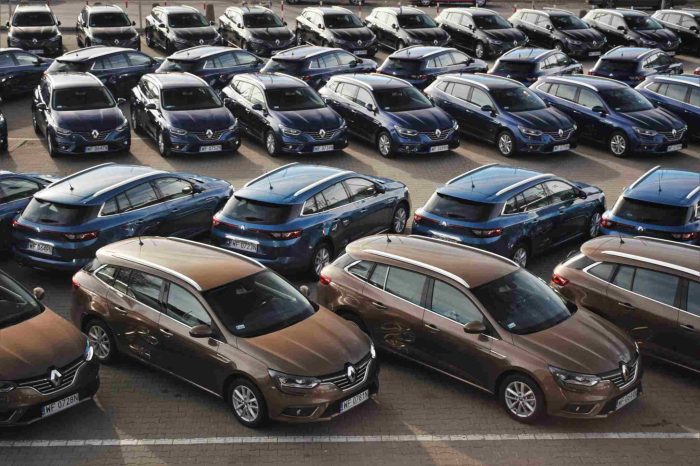
Used cars generally have lower reliability ratings compared to new cars. However, this can vary depending on the age, mileage, and previous ownership history of the used car. Newer used cars with lower mileage and fewer previous owners are likely to be more reliable than older used cars with higher mileage and multiple previous owners.
Maintenance Costs
Maintenance costs for used cars are typically higher than those for new cars. This is because used cars may require more frequent repairs and replacements of parts due to wear and tear. The cost of maintenance can also vary depending on the make and model of the car, as well as the availability of parts and labor in your area.
Age and Mileage
The age and mileage of a used car can have a significant impact on its reliability and maintenance costs. Older cars with higher mileage are more likely to experience mechanical problems and require more frequent repairs. This is because the components of the car have been subjected to more wear and tear over time.
Previous Ownership
The previous ownership history of a used car can also affect its reliability and maintenance costs. Cars that have been well-maintained and driven by responsible owners are more likely to be reliable and have lower maintenance costs. On the other hand, cars that have been neglected or abused by previous owners are more likely to experience problems and require more frequent repairs.
Features and Technology: Used Car Or New Car Instead?
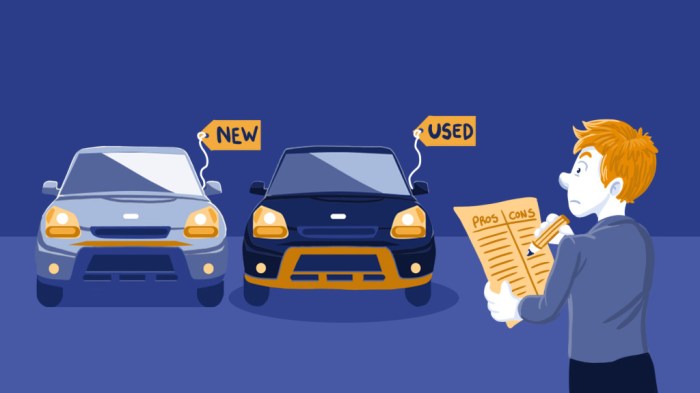
When comparing used and new cars, it’s essential to consider the available features and technology. Newer cars often boast more advanced systems and amenities, but used cars can still offer a range of features that meet your needs.
Standard Features
Typically, new cars come with a wider array of standard features than used cars. These may include power windows, locks, and mirrors, as well as air conditioning, cruise control, and Bluetooth connectivity. Used cars may have fewer standard features, but they can still offer essential amenities like air conditioning and power windows.
Available Features
New cars often offer a wider range of available features than used cars. These may include advanced safety systems like lane departure warning, adaptive cruise control, and blind-spot monitoring. They may also offer premium infotainment systems with large touchscreens, navigation, and smartphone integration.
Used cars may have fewer available features, but they can still offer desirable options like heated seats, sunroof, and premium audio systems.
Technology Comparison Table
To help you compare the features and technology of used and new cars, we’ve created the following table:| Feature | Used Cars | New Cars ||—|—|—|| Power windows | Standard | Standard || Power locks | Standard | Standard || Power mirrors | Standard | Standard || Air conditioning | Standard | Standard || Cruise control | Standard | Standard || Bluetooth connectivity | Standard | Standard || Lane departure warning | Optional | Standard || Adaptive cruise control | Optional | Standard || Blind-spot monitoring | Optional | Standard || Touchscreen infotainment system | Optional | Standard || Navigation | Optional | Standard || Smartphone integration | Optional | Standard || Heated seats | Optional | Optional || Sunroof | Optional | Optional || Premium audio system | Optional | Optional |
Depreciation and Resale Value
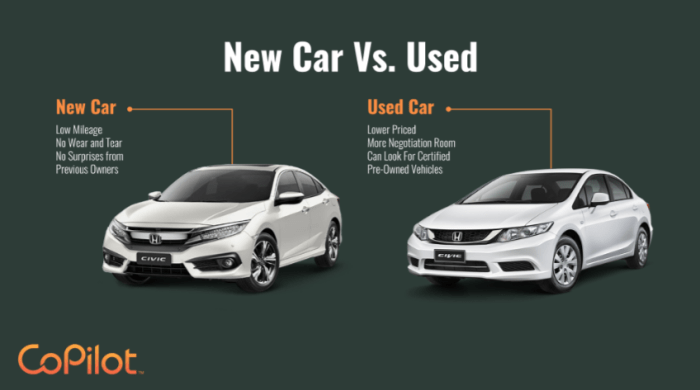
When deciding between a new and used car, it’s crucial to consider their depreciation rates and projected resale values. Depreciation is the decrease in a car’s value over time, and it can vary significantly depending on the car’s age, mileage, and condition.New
cars typically depreciate rapidly in the first few years of ownership, losing a significant portion of their value. Used cars, on the other hand, have already experienced some depreciation, so their value tends to decline more gradually. However, factors such as age, mileage, and condition can still impact the resale value of a used car.
Age
As a car ages, its value generally decreases. This is because older cars are more likely to have mechanical issues and require repairs. Additionally, newer cars often offer more advanced features and technology, making older cars less desirable to potential buyers.
Mileage
Mileage is another important factor that affects a car’s resale value. High-mileage cars are typically worth less than low-mileage cars, as they have been driven more and are more likely to need repairs. The average annual mileage for a car is around 12,000 miles, so cars with significantly higher mileage may see a decrease in their resale value.
Whether to buy a used car or a new car is a common dilemma, but have you considered the emerging world of cryptocurrency? How to Start Trading Crypto for Beginners: A Comprehensive Guide offers a comprehensive introduction to this exciting market.
Embark on a journey to understand crypto trading and discover the potential to grow your financial portfolio, all while navigating the world of used and new car purchases.
Condition
The overall condition of a car can also impact its resale value. Cars that have been well-maintained and have a clean accident history are generally worth more than cars that have been neglected or have been involved in accidents. Cosmetic damage, such as dents or scratches, can also affect a car’s resale value.Understanding
the depreciation rates and projected resale values of used and new cars can help you make an informed decision about which type of car is right for you. If you’re looking for a car that will hold its value well, a new car may be a better choice.
However, if you’re on a budget or don’t mind driving an older car, a used car can be a more affordable option.
Environmental Impact
When it comes to environmental impact, both used and new cars have their pros and cons. Let’s delve into the nuances of each option to make an informed choice.
Used cars have a lower environmental impact during production, as they do not require the extraction and processing of raw materials, which can be energy-intensive and polluting. They also contribute less to greenhouse gas emissions and air pollution during manufacturing.
Additionally, used cars can extend the lifespan of existing vehicles, reducing the need for new car production and the associated environmental costs.
Fuel Consumption and Emissions
In terms of fuel consumption and emissions, newer cars often have better fuel efficiency and lower emissions due to advancements in engine technology and emission control systems. This can translate into lower operating costs and a reduced carbon footprint over the lifetime of the vehicle.
However, older used cars may have lower fuel efficiency and higher emissions, contributing more to air pollution and climate change.
Materials and Waste
Used cars can contribute to waste reduction by extending the lifespan of existing vehicles. They also reduce the demand for new car production, which can help conserve resources and reduce the environmental impact associated with mining, manufacturing, and transportation of materials.
However, the disposal of old and non-functioning used cars can also pose environmental challenges, requiring proper recycling and waste management practices.
Lifestyle and Usage
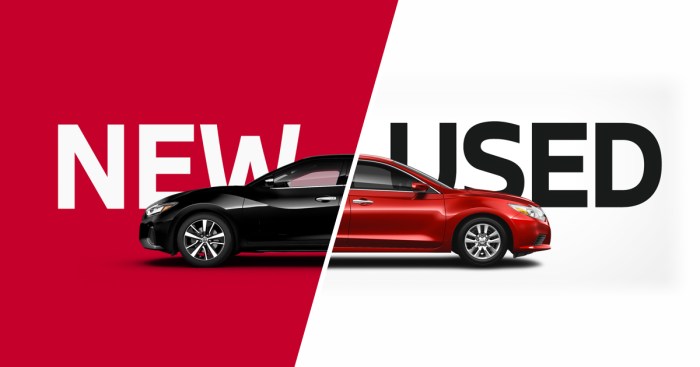
When it comes to choosing between a used or new car, it’s essential to consider your lifestyle and driving habits. Your budget constraints and lifestyle preferences play a significant role in determining which option is the right fit for you.
In the realm of financial decisions, the age-old dilemma of choosing between a used car or a new one continues to perplex many. While a used car may offer a more budget-friendly option, the allure of a brand-new ride can be hard to resist.
But what if there was a way to explore a different financial avenue? Enter the world of crypto trading. Our comprehensive guide, How to Calculate Profit in Crypto Trading , will equip you with the knowledge to navigate the crypto market and potentially reap significant profits.
As you weigh the pros and cons of a used car versus a new one, consider the potential returns that crypto trading could bring to your financial future.
Individual Driving Habits
Your daily commute, the frequency of long trips, and the type of terrain you typically drive on can impact your car’s wear and tear. If you drive long distances or in challenging conditions, a newer car with advanced safety features and a reliable engine may be a better choice.
On the other hand, if your driving is primarily short and infrequent, a used car with lower mileage could be a more economical option.
Budget Constraints
Your budget is a crucial factor in deciding whether to buy a used or new car. New cars come with a higher price tag, but they also offer the latest features, better fuel efficiency, and a lower risk of unexpected repairs.
Used cars, on the other hand, are more affordable, but they may require additional maintenance and repairs over time. Consider your financial situation and the long-term costs of ownership before making a decision.
Lifestyle Preferences
Your lifestyle preferences can also influence your choice. If you value convenience and peace of mind, a new car with a warranty may be more appealing. However, if you’re more budget-conscious and willing to put in some extra effort, a used car can provide a reliable and affordable transportation option.
Ultimately, the best choice depends on your individual needs and priorities.
Financing Options
Buying a car, whether new or used, often involves financing options to make the purchase more manageable. Understanding the financing options available can help you make an informed decision that aligns with your financial situation and goals.There are several financing options available for both new and used cars.
These include traditional auto loans, lease agreements, and in-house financing offered by some dealerships. Each option has its advantages and disadvantages, so it’s important to compare them carefully before making a decision.
Loan Terms
Loan terms typically range from 24 to 84 months, with shorter terms resulting in higher monthly payments but lower total interest paid over the life of the loan. Longer terms, on the other hand, lead to lower monthly payments but higher total interest paid.
The specific loan term that’s right for you will depend on your budget and financial goals.
Interest Rates
Interest rates on auto loans vary depending on factors such as your credit score, the loan term, and the type of vehicle you’re financing. Generally, new cars have lower interest rates than used cars, and borrowers with higher credit scores qualify for lower interest rates.
It’s important to shop around and compare interest rates from multiple lenders to ensure you’re getting the best possible deal.
Down Payment Requirements
A down payment is a lump sum of money you pay upfront when you finance a car. A larger down payment can reduce your monthly payments and the total amount of interest you pay over the life of the loan.
However, it’s important to note that a larger down payment may not always be feasible for everyone.
Insurance Considerations
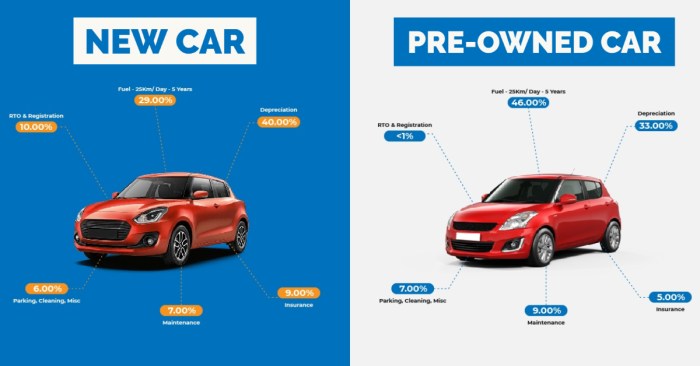
Insurance premiums for used and new cars vary based on factors such as age, driving history, and vehicle value. Typically, insurance costs are higher for younger drivers with less experience, as they are considered higher risk. Additionally, vehicles with a higher value tend to have higher premiums due to the potential for more expensive repairs or replacements.
Deductibles, which represent the amount you pay out-of-pocket before insurance coverage kicks in, can also impact insurance costs. Higher deductibles generally result in lower premiums, but it’s important to choose a deductible that you can afford to pay in the event of an accident.
Coverage Options
Insurance coverage options can also influence premiums. Comprehensive and collision coverage, which protect against damage to your vehicle from non-accident-related events and collisions, respectively, typically cost more than liability coverage, which only covers damage to others’ property and injuries.
Emotional and Subjective Factors
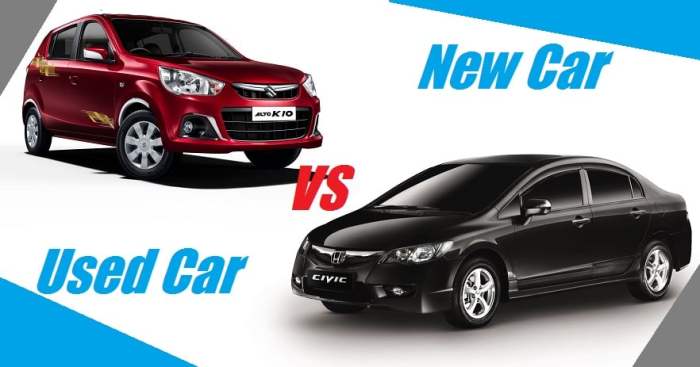
Choosing between a used or new car is not just a financial decision but also an emotional one. Several subjective factors can influence your choice, such as perceived status, pride of ownership, and personal preferences.
Whether you’re debating between a used car or a new one, understanding the nuances of each option is crucial. However, if you’re looking for a lucrative alternative to traditional investments, consider exploring the world of cryptocurrency. Our comprehensive guide, How to Profit Trading Crypto , provides a roadmap to navigate the crypto market effectively.
With the knowledge gained, you can make informed decisions not only about your next car purchase but also about potential financial opportunities.
Perceived Status
For some individuals, owning a new car is a symbol of success and status. It conveys a sense of accomplishment and can boost self-confidence. Conversely, driving a used car may be perceived as less prestigious, leading to feelings of inadequacy or social stigma.
Pride of Ownership
The feeling of owning something brand-new can be exhilarating. It brings a sense of pride and accomplishment that can make driving a new car a more enjoyable experience. The pristine condition and the latest features can provide a sense of satisfaction and fulfillment.
Personal Preferences
Ultimately, the decision between a used or new car often comes down to personal preferences. Some people prefer the peace of mind that comes with a new car and its warranty, while others prioritize affordability and practicality. Some may prefer the classic charm of an older car, while others crave the cutting-edge technology of a newer model.
Warranty and Protection Plans

When considering a used or new car, it’s crucial to factor in the available warranty coverage and protection plans. New cars typically come with a comprehensive manufacturer’s warranty that covers major components for a specific period. Used cars, on the other hand, may have limited or no warranty coverage, depending on their age and condition.Extended
warranties and service contracts offer additional protection beyond the manufacturer’s warranty. Extended warranties extend the coverage period for specific components or systems, while service contracts provide coverage for maintenance and repairs. These plans can provide peace of mind and financial protection against unexpected repair costs.
The question of whether to buy a used car or a new car is often a matter of budget and lifestyle. For those looking to save money, a used car may be the better option. However, if you’re looking for the latest features and technology, a new car may be worth the investment.
If you’re interested in exploring alternative investment options, you might consider learning about cryptocurrency trading. A great resource for beginners is How Trading Crypto Works: A Beginner’s Guide . Whether you choose a used car or a new car, make sure to do your research and find the best deal for your needs.
However, it’s important to carefully review the terms and conditions of these plans to understand the coverage limitations and exclusions.
Benefits of Extended Warranties and Service Contracts, Used car or new car instead?
- Peace of mind and reduced financial risk in case of major repairs.
- Extended coverage beyond the manufacturer’s warranty period.
- Potential savings on repair costs compared to paying out-of-pocket.
Limitations of Extended Warranties and Service Contracts
- Additional cost that may not always be justified by the likelihood of major repairs.
- Limited coverage for certain components or systems.
- Deductibles and exclusions that may apply.
- Potential for disputes or denied claims.
Closing Notes
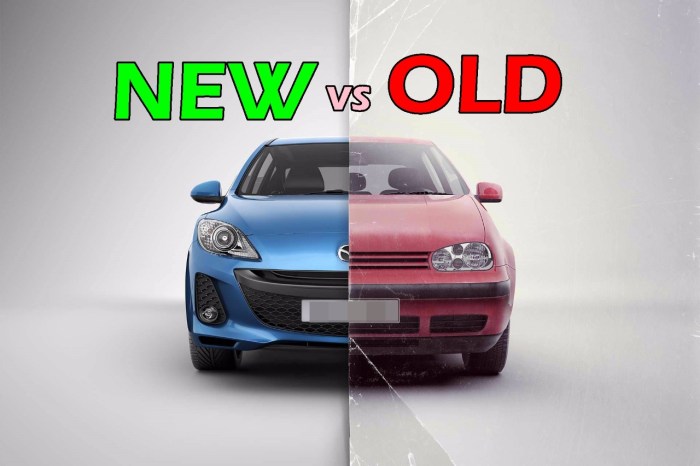
Ultimately, the choice between a used or new car depends on your individual circumstances and preferences. Weigh the factors discussed in this guide, consider your budget, lifestyle, and driving habits, and you’ll be well on your way to finding the perfect car for your journey.
Remember, the car you choose is more than just a mode of transportation; it’s a reflection of your personality and a companion on your adventures. Embrace the excitement of car ownership, and may your journey be filled with miles of smiles.
FAQ Summary
What are the key factors to consider when choosing between a used or new car?
Cost, reliability, features, depreciation, lifestyle, and financing options are all important factors to weigh when making your decision.
Is it better to buy a used car with low mileage or a new car with high mileage?
Mileage is an important factor, but it’s not the only one. Consider the car’s age, maintenance history, and overall condition before making a decision.
What are the advantages of buying a used car?
Used cars are typically more affordable, have lower insurance premiums, and offer a wider selection of makes and models.
What are the advantages of buying a new car?
New cars come with the latest features and technologies, have higher reliability ratings, and offer peace of mind with a manufacturer’s warranty.





